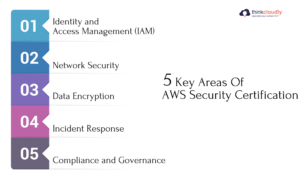In today’s digital landscape, ensuring the security of your data and applications is of paramount importance. As businesses increasingly embrace cloud computing, it is crucial to have professionals who possess a deep understanding of cloud security best practices. This is where AWS Security Certification comes into play. In this blog post, we will explore the significance and how it can help professionals establish their expertise in securing cloud environments.
If you’re looking to embark on a comprehensive AWS security certification journey, AWS offers a well-structured and thorough path to help you attain the necessary expertise. This AWS security certification path begins with the AWS Security Fundamentals certification, providing you with a solid grounding in the fundamental principles of securing AWS cloud environments. From there, you can progress along the AWS Security Learning Path, which offers a range of intermediate to advanced certifications tailored to various security roles and domains. Ultimately, by following this AWS security certification path, you’ll acquire the in-depth knowledge and skills needed to excel in cloud security and safeguard AWS resources effectively.
AWS Cloud Security Certification Path: Navigating the AWS Security Journey
Navigating the AWS security path involves understanding the comprehensive AWS Cloud Security Certification path. This path encompasses various certifications that validate your expertise in securing cloud environments. It starts with foundational certifications like AWS Certified Cloud Practitioner and progresses to more specialized security certifications like AWS Certified Security – Specialty. This certification path equips individuals with the skills needed to implement robust security measures, design secure architectures, and protect data on the AWS platform. By following the AWS Cloud Security Certification path, you gain a well-rounded understanding of AWS security best practices, enabling you to contribute to the safeguarding of cloud-based infrastructures and applications effectively.
Watch This Video and Learn About Best 6 AWS Security Interview Questions and Answers
AWS Security Certification: An Overview
It is a comprehensive program offered by Amazon Web Services (AWS) that validates an individual’s knowledge and skills in designing and implementing secure applications and infrastructure on the AWS platform. As the leading cloud service provider, AWS understands the critical importance of robust security measures to protect data and applications in the cloud.
The AWS Security program is designed to equip professionals with the necessary skills to identify and mitigate security threats and risks in AWS-based environments. It covers a wide range of security domains, ensuring that certified individuals have a holistic understanding of cloud security best practices and can implement them effectively.
Build Your Career as a
AWS Cloud Architect
- Live Projects
- Resume / Interview Preparation

The certification program focuses on various key areas, including:

- Identity and Access Management (IAM): IAM is a fundamental aspect of cloud security, allowing organizations to control access to AWS resources. AWS Security Certification emphasizes understanding IAM policies, roles, and permissions to ensure secure access management.
- Network Security: Securing network infrastructure is essential to protect data in transit and prevent unauthorized access. AWS Security Certification covers topics such as Virtual Private Cloud (VPC) security, network ACLs, security groups, and AWS Direct Connect, enabling professionals to design and implement robust network security architectures.
- Data Encryption: Data encryption is a critical aspect of securing sensitive information. AWS Certification delves into encryption methods, AWS Key Management Service (KMS), and data encryption at rest and in transit, equipping professionals with the knowledge to safeguard data stored within AWS.
- Incident Response: Rapid and effective incident response is crucial in minimizing the impact of security incidents. AWS Security prepares professionals to handle security incidents by covering topics such as monitoring and logging, AWS CloudTrail, and incident response best practices.
- Compliance and Governance: Compliance with industry regulations and standards is vital for organizations operating in various sectors. AWS Security provides an understanding of compliance frameworks, such as the General Data Protection Regulation (GDPR), the Payment Card Industry Data Security Standard (PCI DSS), and the Health Insurance Portability and Accountability Act (HIPAA), ensuring professionals can design and implement secure and compliant AWS environments.
Boost your earning potential with AWS expertise. Explore our certified AWS Courses for a high-paying career
Benefits of AWS Security Certification:
- Industry Recognition: Obtaining an AWS Security Certification demonstrates your commitment to cloud security and showcases your expertise to potential employers or clients. It serves as tangible proof of your knowledge and skills in securing AWS environments.
- Enhanced Cloud Security Skills: The certification program covers a wide range of security topics, including identity and access management, network security, data encryption, incident response, and more. By pursuing this, you will acquire in-depth knowledge of AWS security services and best practices, enabling you to design and implement secure solutions effectively.
- Career Advancement Opportunities: Cloud security is a rapidly evolving field, and businesses are actively seeking professionals who can protect their valuable assets in the cloud. AWS Certification can provide you with a competitive edge in the job market, opening up new career opportunities and potentially leading to higher salaries.
AWS Certification Levels:
AWS offers multiple levels of AWS security certifications, catering to different roles and expertise levels. Here are some of the prominent certifications in the AWS Security track:
- AWS Certified Security – Specialty: This certificate validates your advanced knowledge and skills in securing AWS workloads and architectures. It covers topics such as incident response, security operations, infrastructure security, and data protection.
- AWS Certified DevOps Engineer – Professional: While not exclusively an AWS certification, this credential demonstrates your expertise in implementing secure DevOps practices on AWS. It covers aspects such as infrastructure security, continuous delivery, and automation of security controls.
Build Your Career as a
AWS Security Specialist
- Live Projects
- Resume / Interview Preparation

Preparing for AWS Security Certification:
To ensure success in your AWS Certification journey, it is crucial to have a well-rounded study plan. Here are some steps to help you prepare effectively:
- Familiarize Yourself with AWS Security Services: Gain hands-on experience with AWS security services such as AWS Identity and Access Management (IAM), AWS Web Application Firewall (WAF), AWS Key Management Service (KMS), and AWS CloudTrail. Understand their features, use cases, and integration methods.
- Study the Exam Guide: Review the official AWS Certification exam guide provided by AWS. It outlines the exam domains, knowledge areas, and recommended resources for study.
- Leverage Official AWS Training Resources: AWS offers a wide range of training resources, including instructor-led courses, online tutorials, practice exams, and whitepapers. These resources are designed to help you deepen your understanding of AWS security services and concepts.
- Hands-on Experience: Practice implementing security controls and configurations in a real AWS environment. Consider using AWS Free Tier or AWS Sandbox accounts to experiment with different scenarios and reinforce your knowledge.
- Join Study Groups and Communities: Engage with fellow professionals pursuing Certification. Participate in online forums, study groups, or community events to exchange knowledge, discuss best practices, and clarify doubts.
Looking for a trusted training provider to help you prepare for AWS Certification? Look no further than Thinkcloudly. With their comprehensive AWS Security training, led by experienced instructors and featuring hands-on labs, Thinkcloudly equips you with the skills and knowledge needed to excel in securing cloud environments. Whether you’re aiming to enhance your career prospects or strengthen your organization’s cloud security, Thinkcloudly’s training program is designed to support your success in obtaining AWS Security Certification.
Conclusion:
Securing cloud environments is a top priority for organizations, and AWS Security Certification Training equips professionals with the skills and knowledge required to tackle modern cloud security challenges. By earning a Certificate, you demonstrate your commitment to cloud security and gain industry recognition for your expertise.
Whether you are an IT professional looking to advance your career or an organization seeking to enhance your cloud security measures, certification is a valuable asset. Remember, in the rapidly evolving world of cloud computing, investing in your skills and knowledge is essential to staying ahead. So, embark on your Certificate journey today and unlock a world of opportunities to strengthen your cloud security expertise with confidence.










